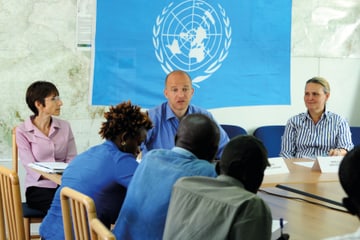Staff positions at the UN
Interested in becoming a UN staff? Almost any highly qualified professional can find a meaningful job within the UN system.
To be eligible, you need a relevant educational background, work experience, language skills, and a range of ‘soft skills’. You can apply for a specific position or join a talent group or roster.
Professional or so-called ‘P-level’ staff positions generally require highly qualified academic and professional backgrounds with several years of international experience.

About the minimum requirements
The requirements for qualified professionals keep changing. Today, the UN increasingly seeks qualified candidates with private sector background to be able to effectively and timely deliver their services. Newly emerging profiles include specialists in supply chain management, innovative finance etc.
Each organisation may also have preferences in terms of requirements and sought profiles. UNDP for example regularly seeks experts in public policy and environmental sciences, while UNICEF has a high demand for child protection and nutrition officers. Similarly, certain organisations require experience in programme countries and conflict settings while others consider experience working in the private sector and large corporations an asset.
For 'P-level' positions, a Master’s degree and excellent command of English, and/or French, Spanish, Russian or Arabic, are generally required. Depending on the duty station, proficiency in other languages may be required.
Professional experience is only considered if relevant for the specific position.
Staff positions in the 'General Service or related categories' require at least a high school diploma and several years of work experience relevant to the job and its level, as specified in the job opening.
Besides technical skills, applicants should demonstrate a range of ‘soft skills’ that are based on UN core values as shown below.
Soft skills based on UN core values
Core Values
- Integrity
- Professionalism
- Respect for diversity
Core Compentencies
- Communication
- Teamwork
- Planning & Organizing
- Accountability
- Creativity
- Client Orientation
- Commitment to Continuous Learning
- Technological Awareness
Managerial Competencies
- Leadership
- Vision
- Empowering Others
- Building Trust
- Managing Performance
- Judgement / Decision-making
Salaries and benefits
The pay level for staff of professional and higher categories is based in accordance with the highest paying national civil service (Noblemaire principle). The base salary is supplemented by a post adjustment that varies according to the cost of living in the duty station and the US dollar exchange rate.
Staff may be entitled to other allowances and benefits such as education grants for their children, rental subsidy, medical insurance, and relocation expenses, which may add up quite substantively to the base salary. UN salaries are subject to the UN’s tax system (“staff assessment”) and are therefore exempt from national income tax.
To calculate the estimated salaries and benefits of international UN staff members, use UNDP’s salary estimation tool.
Career development
Career development and promotions modalities vary in each UN organisation.
For example, some UN organisations (such as WFP and UNHCR) have a rotation system for staff members, which offers certain job security. Others have such rotation systems only for senior management, or do not have any career development planning systems at all.
While some organisations such as UNICEF allow their interns and consultants to apply for staff positions in the same organisation, others, including the UN Secretariat, require interns and consultants to take a break in service and are not eligible to apply for a staff position within 6 months after completion of their contract.
To advance within a UN organisation, you will normally need to submit an application for your next career move or promotion.
Your own career planning initiative, including networking, is key.
Look out and apply for vacant positions advertised internally and externally. While career development within the same organisation is easier, moving across UN organisations is more and more encouraged.
Our services – to take you further
cinfo supports Swiss professionals considering a career with the UN or a development bank, and those already in the system:



